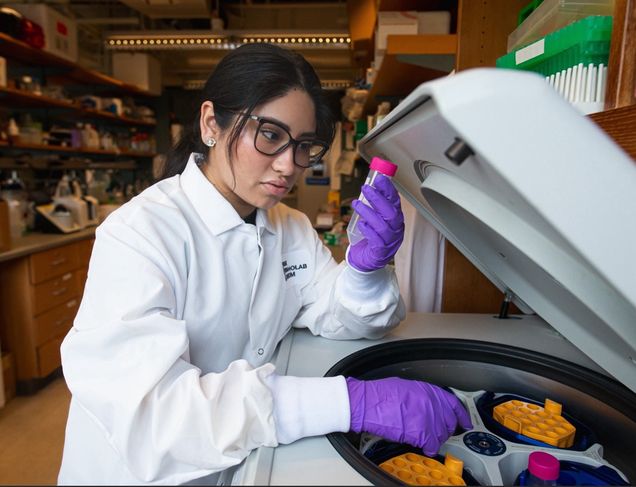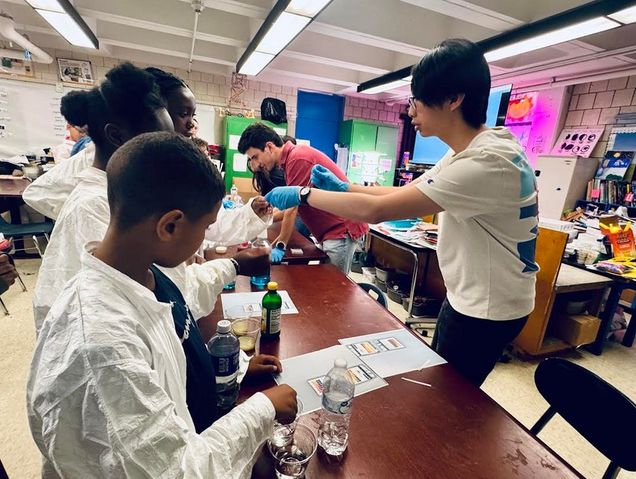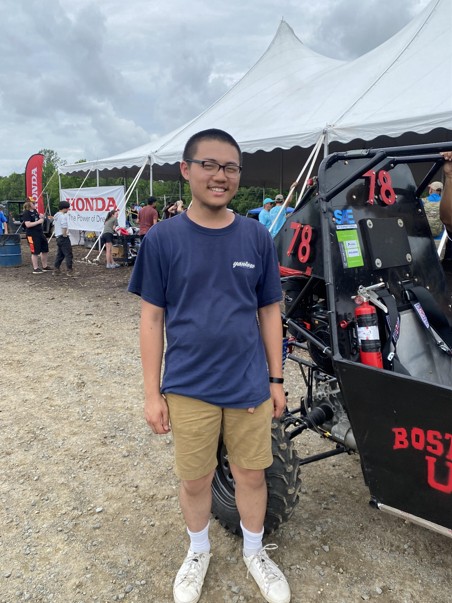Meet the Case Scholars
This year’s ENG recipients of the prestigious BU scholarship want to bring engineering solutions and education to more people
Pursuing dreams of solving challenges in neurological disorders and making engineering education accessible, three of the College of Engineering’s star seniors received the prestigious Harold C. Case Scholarship this year.
Named for Boston University’s fifth president, the Case Scholarship is one of the highest distinctions granted to undergrad students at Boston University. Selection criteria include academic excellence, extracurricular involvement, contributions to the University, and scholarly potential.
Meet ENG’s 2025/2026 Case scholars.
Bringing solutions to people who need them most
One day when she was six years old, Camila Aragón Alfaro (’26) rode along on a call with her mother, a neurologist in Lima. The patient in distress lived hours away from the capital city, in an impoverished town in the Peruvian countryside. By the time Camila’s mother reached the bedside, it was too late. The patient had died.

“That was the first time I felt the weight of something deeply wrong,” Aragón says, “that neurological care was not only limited but often out of reach entirely.” The experience launched Aragón on her journey to BU and eventually, she hopes, a professional career at the intersection of neuroengineering and molecular engineering, developing innovative therapeutic strategies for neurological disorders.
“So much remains unanswered” about the brain, says Aragón, a biomedical engineering (BME) major. “By designing molecular tools—whether through RNA-based regulators or nanoscale interventions—we have a chance to succeed where everything else has failed, to go deeper, to learn more, and to bring real solutions to the people who need them most.”
Aragón has worked in the Green Laboratory and the Computational Imaging Systems Lab at BU as well as the Bathe BioNanoLab at MIT and the Ablation Biophysics Lab at Brigham and Women’s Hospital. She also serves as an Engineering Ambassador, and she founded BU’s first Peruvian Club.
“Camila is a stellar scholar and researcher who richly deserves the Case scholarship,” says Associate Professor Alexander Green (BME). “She’s played a really important role in developing new diagnostic tests in my lab, and I’m excited to see what Camila will accomplish in the years to come.”
To make science more accessible
Another burgeoning biomedical researcher at the intersection of molecular biology and nanotechnology, Terry Chen (’26) has made it a goal to become a strong scientific communicator. “I am now committed to presenting research in ways that are accessible to a broad audience,” he says.
Chen has worked in the lab of Assistant Professor Erica Pratt (BME) for more than two years, helping to develop a novel biosensor for colorectal cancer diagnostics. “Working in the lab has been instrumental in honing my hands-on research skills, from synthesizing custom peptides to cultivating cancer cells,” Chen says. “More importantly, it has deepened my understanding of the importance of interdisciplinary collaboration.”

Working with experts and students across disciplines, Chen came to see the value of effective communication, and he challenged himself to hone that skill. Chen has now presented research at the BU Undergraduate Research Symposium and the Harvard National Collegiate Research Conference. This fall, he presented research in Paris at the iGEM Grand Jamboree, as part of BU’s award-winning iGEM team. Working in the lab of Assistant Professor Miguel Jimenez (BME), the students developed a novel at-home diagnostic for bacterial vaginosis (BV).
Chen has also tutored ENG students, served as a teaching assistant, and mentored high school students. “These experiences have helped shape my goal of pursuing a PhD,” Chen says, “not only to conduct impactful research, but also to make science more accessible and inclusive.”
Says Pratt, “Terry’s exceptional independence, intellectual rigor, and drive make him a standout student researcher and a future innovator and leader in biomedical engineering.”
A leader in classes and clubs
Like Chen, Xiang Jin (’26) has a passion for helping newer students grasp difficult concepts. A double major in computer engineering and physics, Jin served for two years as a learning assistant for physics courses in the College of Arts & Sciences. “I understand that this field is full of pitfalls and subtleties that defy our intuitions sometimes,” Jin says.

That drive to help peers master complex material has carried over into Jin’s engineering classes as well. In Logic Design, one of the courses Jin took with Master Lecturer and Research Assistant Professor Tali Moreshet (ECE), “Xiang selected one of the more challenging topics for the final project,” Moreshet says. “Students working on that project encountered unexpected issues which didn’t have an obvious, immediate solution. Xiang came up with a unique approach, which I was then able to propose to other students as a way to overcome their issues.”
Jin has been a leader in other ways, notably in his extracurricular engineering clubs. As a sophomore, Jin revived BU’s Unmanned Aerial Vehicles Team, which is developing an autonomous quad-plane. He is also electrical subteam lead for the BU Baja team, a club that builds off-road cars to compete in the Society of Automotive Engineers’ Baja competition.
“Nothing I did at BU was premediated,” Jin says, “but sometimes I think there is some force out there that pushes you to do a certain thing that cascades forward into a series of events that you never thought was possible. Looking back, I think I’ve made an impact on the BU community that I can be proud of.”